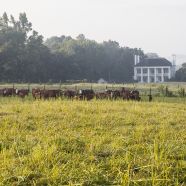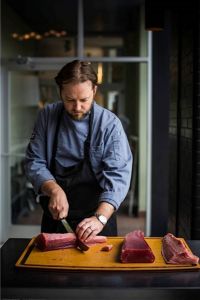Tied to the Land: A Chef’s Connections to Local Food
South Writ Large spoke with Chef Erik Niel over the phone recently to learn more about his restaurant, Easy Bistro, and the Harvested Here program in Chattanooga, Tennessee.
In Chattanooga, Tennessee, the convergence of a South Louisiana childhood, a love of French cooking and foodways, and a passion for using local ingredients and supporting local community has helped spawn both a top-notch restaurant and a local food distribution network. Chef Erik Niel has brought his take on French-inspired Southern dining to the city with his restaurant, Easy Bistro, and his and his wife’s work with the Harvested Here program benefits not only chefs and restaurant goers, but also residents struggling with food security.
Niel’s story and his ties to the land of his childhood begin in South Louisiana where family and fellowship often revolved around harvesting and cooking local ingredients. “For me it was about hunting and fishing with my dad and my friends, and then coming back home and doing something with it,” says Niel. He found himself becoming more and more interested in cooking and learning old recipes from his grandparents, and he relished the food-saturated culture of southern Louisiana. “You associate memories with food and with people,” he says, “and that kind of commonality of knowing who in the neighborhood had made the best gumbo and made the best red beans and rice or coubillon . . . was really formative. There was enough familiarity amongst people that they would share recipes. They would share ideas.” Niel says it was not until he left southern Louisiana that he fully appreciated its influence on him. “It took me moving away to realize how special it was,” he says. “I think that’s just human nature to not really understand where you are until you leave it. But, you know, food and that culture and that relation to the land and that relation to people was so deeply ingrained in me at a young age that when it was gone, when I left, it was very noticeable, instantly.”
This same grounding in French-inspired Louisiana food and culture carried over into Niel’s culinary career and in turn evolved into an interest in using fresh local ingredients. “When I first started becoming interested in cooking professionally, even though I wasn’t living in Louisiana, my initial draw was always to the Creole food, specifically New Orleans and New Orleans restaurants. And so, with minimal digging at that point, it didn’t take much to figure out that that cuisine is so rooted in French cuisine, and how there are little twists and amalgams of old classic French recipes. Creole or New Orleans cuisine red beans and rice is just a variation of cassoulet, right? So that was what I was drawn to as a chef. . . . I went from New Orleans to French, and then I got stuck. I fell totally head over heels in love with the south of France and traveled there. I’ve enjoyed the markets and the freshness with which people prepare food from the south of France, and I find a lot of that cuisine to be very analogous to what happens in the southern part of the United States. Because it’s cooking with what is seasonal and what is available. And they do have, for lack of a better word, four seasons in the southern part of France, just as we do here. Being in the South, I think one of our greatest assets, and my chef de cuisine and I talk about it all the time, is we really have four seasons we have to cook through. . . . All of what I’ve done from there is just an offshoot of growing up in Louisiana, being fascinated by the cuisine of New Orleans, tracing it back historically to the South of France, and then translating it right back to the southern part of the United States.”
Now Niel enjoys using all he has brought from his past as both a native Southerner and a professional chef to introduce and establish new dining traditions in Tennessee. “We have our own riff on strawberry shortcake that we modify all the time. Our last one was strawberries in rosewater with chocolate biscuits, and people really like it,” says Niel. He says he thinks it was difficult in the past to cultivate new culinary traditions in the South because for so long people in the region were struggling with widespread poverty and living, by necessity, with a perpetual subsistence mindset. “It’s hard to do super cheap Southern food and have quality, so people just substituted quantity, and for years the level of satiety was determined by how full you felt–not how good the food was. And I think that’s been really hard on the South, especially this part of the South, for a long time. And it’s just now beginning to turn, where people have a better relationship with food and enjoy the freshness of it and don’t have to measure the success of a meal by how full you feel at the end of it.”
As a way to help those in the Chattanooga area who continue to struggle with issues of poverty and food security, Niel and his wife, Amanda Niel, helped found and continue to support the Harvested Here Food Hub, a storage, marketing, and distribution program to connect farmers in the areas in and around Chattanooga with regional restaurants, retailers, and institutions wanting to buy from local sources. According to Niel, the Chattanooga Area Food Bank runs the Harvested Here Food Hub. The food bank receives proceeds from the Hub’s sales and is also able to distribute any remaining food to those in greatest need in the community. “It’s an incredible win-win-win for everybody,” says Niel. “I think it’s just awesome for restaurants to be able to support the food bank. If there’s one thing we all believe in, it’s food and people’s access to food. Doing business with Harvested Here helps the food bank have more food, be able to distribute more, and have more revenue to do more. . . . Not to mention, they’ve made it a whole lot easier for us to get the product that we need. . . . It is the direct link [between farmers and restaurants] that we’ve all wanted and needed for so long. It formalized the local system, and will continue to do so as it grows.” The system also frees farmers from extra work not directly connected with the farming itself. “They don’t have to be in the business of marketing their product. They take it to the Food Hub, to Harvested Here, and they’re done. If they’ve got five hundred pounds of tomatoes, they can sell their five hundred pounds of tomatoes in one stop. Then they go back to farming.”
Niel says he and his wife “couldn’t be more supportive” of what the Harvested Here Food Hub is doing and calls it “a dream come true” for the restaurant and a wonderful way to help get food to the people who need it most.
“I can only encourage more local people to support the local food scene,” says Niel. “It really is such a unique thing to us, and in doing that you’re supporting your neighbors.”








